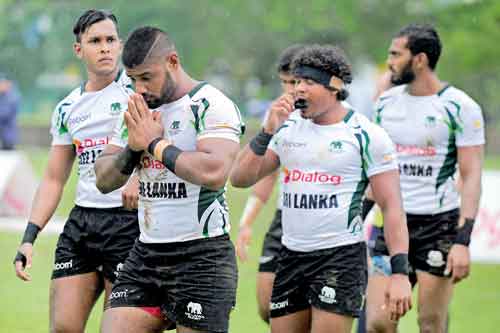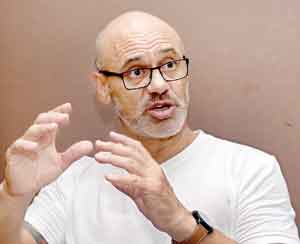Sri Lanka’s 7s Rugby woes
 While top Asian 7s Rugby nations, namely Japan, Hong Kong, South Korea and Malaysia have set their sights on the World Series, Sri Lanka is making futile attempts to discover where the sport really belongs. In Sri Lanka talent comes in bulk. Sri Lanka are the pioneers of Rugby in Asia and the second most popular spectator sport in the country, after Cricket. But does Sri Lanka justify its cause in competing even at the Asian 7s Series, which takes place annually in three installments, to pick a side for the World Series?
While top Asian 7s Rugby nations, namely Japan, Hong Kong, South Korea and Malaysia have set their sights on the World Series, Sri Lanka is making futile attempts to discover where the sport really belongs. In Sri Lanka talent comes in bulk. Sri Lanka are the pioneers of Rugby in Asia and the second most popular spectator sport in the country, after Cricket. But does Sri Lanka justify its cause in competing even at the Asian 7s Series, which takes place annually in three installments, to pick a side for the World Series?
Sri Lanka has been exploring for answers to this question through former top national players to head the coaching outfit and, from time to time, by appointing international experts for ages, but without success. Even the latest to head Sri Lanka’s 7s coaching setup, Peter Woods, a former New Zealand 7s player and a renowned international coach, calls his local assignment a ‘challenge and a learning curve’.
“It’s a challenge for me as a coach, and with the teams I have worked with before in my career, the period I spent in Sri Lanka training the national 7s team, was a learning curve. If I sum up what I have observed during my stay here, Rugby is a puzzle, and there are lots and lots of pieces missing in it, to solve the mystery, where I’m really interested in,” Woods told the Sunday Times, a week after Sri Lanka ended up fourth out of eight nations in the Asian 7s Series.
Sri Lanka finished with five points each from Hong Kong and the Korean legs, and placed 3rd in the final leg in Colombo, which earned them eight points. In total, Sri Lanka finishes fourth with 18 points, and will be one of five teams alongside South Korea, China, Philippines and Malaysia, to idle in the same group without hope. Japan earned 12, 10 and 10 points, totaling 32 points, to lead the list. Hong Kong is second with 10, 8 and 12 points from the three legs for a total of 30 points. Hence, Japan and Hong Kong have qualified for the Hong Kong 7s 2018 and the Rugby World Cup 7s 2018. Unimpressive Chinese Taipei will have to play in the 2018 Asian Trophy 7s Series.
In comparison, South Korea, China, Philippines and Malaysia come with clear intentions, while Sri Lanka’s strategy is unclear, considering its recent record in 7s Rugby. From time to time, the Tuskers have given fluctuating performances and have failed to at least come close to their goals. Today, it has become clear that lack of cohesion among Sri Lanka Rugby’s (SLR) stakeholders and the non-existence of a proper structure and plan, are the main reasons for the 7s team languishing.
“There is talent but, it is not properly utilised or, it is badly managed. That was one of the clear observations I made during my eight months here. I honestly feel that Sri Lanka needs to think more seriously of a proper 7s structure,to cement their status at regional level, before thinking further. If that was a concern, I should say that I’m really pleased with the performances of the boys during the Asian 7s Series. They started off with three wins in six games in Hong Kong, and won 3, drew 1 and lost 2 in South Korea, while winning the Plate championships on both occasions. In Colombo they won 4, lost 2 and came third. This shows they improved with every competition and it again shows the team needs more competitions, to be ‘in touch’ with the game. Countries such as Japan and Hong Kong do that,” Woods explained.

Peter Woods was more than one could imagine - Pic by Priyantha Wickramaarachchi
By September, prior to the Asian Sevens Series, Japan have come across 14 international tournaments while Hong Kong too have had a fair share of international exposure. Sri Lanka, in the meantime, had only faced three such competitions, including the two legs of the Sri Lanka Super Sevens.
“It’s really surprising to see them keen interest and following at a school Rugby game, and equally surprising to see its complete opposite at a club game. It shows the need for clubs or its administrators the importance of having a Division II competition at domestic level. This will give opportunities to those potential players who cannot get into the main eight clubs in the country. If they are good enough, these players will get a second chance”.
Sri Lankan Rugby players do have the knack to perform but according to Woods, 7s is not just about grabbing the ball and racing away in a rather less manned playing field. He explained what international 7s Rugby players are equipped with and what most of the local players lack.
“If you take top teams such as Fiji, New Zealand, South Africa or any other team at that level, players have a higher ‘Rugby IQ’, where quick and effective decisions are made in a split second. Those nations have a professional pipeline that feeds the best and fittest athletes to the main team, they hardly fail,” Woods added.
Woods, who has been part of coaching units in New Zealand, France, and Argentina, is rather reserved in what he could achieve alone as a coach. He is a team man, who loves to see finer and long-lasting solutions, and SLR’s intention of contracting twenty 7s players comes as good news for him.
“It’s important to have the players fully committed. If this move materializes, we will be able to have weekly sessions with players, and see their progress and fallbacks. If they need time to recover or, some time off due to injuries or, other reasons, SLR will have the right to look for valid reasons. Sri Lanka needs these kind of changes in order to dream of the global stage,” he went on to say.
It may be too premature to predict when Sri Lanka will compete in the World Series but, what Woods wants to see is Sri Lanka gear up promptly for the future, which is far more competitive than we imagine. That target may always look like a bridge too far to cross, for Sri Lanka, if they are not ready to adopt, at least for now.


